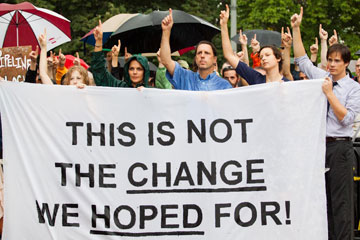
Our generation of ecological writers, scientists, and activists confront a situation without historical analog. 21st Century naturalists and environmentalists genuinely concerned about enjoying and preserving wilderness are forced to accept the harsh realities that what little remains of untouched nature is increasingly subjected to seemingly unstoppable destructive forces. The magnitude of the situation is difficult to accept and understand. The perceptive abilities of the human mind and collective consciousness are thrust into a surreal and uncertain future. Even industrial society’s cornerstones of technological progress and institutionalized science have proven insufficient. Especially since the dramatic “big melt” of arctic ice in 2007, scientists have been forced to admit their models and predictions of climate change have been grossly understated.
 Cara Hoffman |
In response, contemporary voices in environmental writing have adopted a variety of anti-civilization themes, from the revolutionary rhetoric of Derrick Jensen and the Green Anarchist movement to the post-industrial fiction and philosophy of Ran Prieur and the The Dark Mountain Project.
I had the opportunity to discuss the role of radical writing in the age of environmental collapse with author and friend Cara Hoffman (carahoffman.com). Hoffman’s critically acclaimed novel So Much Pretty, named best suspense novel of 2011 by the New York Times Book Review, takes on issues of environmental collapse in rural America. Prior to becoming a novelist Hoffman worked as an environmental reporter for newspapers in upstate New York and was a professor of composition and rhetoric. She additionally contributed to Guerrilla News Network and The Fifth Estate.
AN INTERVIEW WITH CARA HOFFMAN
Ryan King: What is your background and interest in environmental and radical journalism and writing?
Cara Hoffman: I began writing about environmental politics for a small rustbelt newspaper in the 90s, and quickly became educated in the ways corporations destroyed the health of entire communities. So it was really neighborhood specific reporting; dealing with the EPA and the DEC and being on the ground in places where huge parts of the population were suffering from various cancers and reproductive health issues, that led me to more research and to a better understanding of the magnitude of the problem we are all facing.
Ryan King: I can only begin to imagine the anger that will manifest in the next few years as established institutions and governments continue to mismanage the economy and environment. Do you have any suggestions for environmental thinkers to avoid the pitfalls and failures of the current movement?
 Demonstrators at the White House protesting the Keystone pipeline. Photo by Ben Powless/Tar Sands Action. |
Cara Hoffman: Direct action is the only real solution at this point. We can’t rely on the same bodies who wouldn’t sign the Kyoto Protocols to make any decisions that are sane or rational. And we don’t have time for hashing out philosophical differences amongst ourselves anymore. I think the current movement –particularly Bill McKibben’s 350 is doing everything they possibly can under the circumstances. I think Naomi Klein’s piece on climate change and capitalism in the November 28 issue of The Nation does a great job of explaining where we’re at and the kind of comprehensive economic and philosophical changes that are required for us to survive the next several decades. The most important thing we can do now is take this situation as deadly serious as it actually is. Ryan, you mentioned the big melt in 2007, and we also have the increasingly dire and irrefutable news regarding the world’s oceans –so bad it catches my breath every time I read about it—then the rapid melting of the permafrost, each one of these things expedites our extinction. It’s time for people to look at what’s happening and not kid ourselves about the root causes or get caught up in infighting. To that end we can learn a lot from the Occupy movement. It’s great to be fighting finally for the 99 percent. But when it comes to the environment we are fighting for the one hundred percent. People need to realize this.
Ryan King: Modern communication technology has rapidly increased global awareness of our shared plight of environmental crises within a substantial portion of the world population. There remain major gaps between activists who advocate and adopt direct action and the old guard of the science community. Now seems to be a pivotal time for connection between the humanities and sciences. Are you aware of any progress bridging the emotive and analytical aspects of environmental collapse?
Cara Hoffman: I don’t know that we even need to include any other approach in addressing this stuff than a scientific one. The trick is to actually pay attention to the science and act accordingly. In western culture we see the entire natural world as a place over which we have dominion. This is the foundation of religious, political and economic thought. We see ourselves as forever outside the equation, living in a world that was created for our use. That’s a very creepy fairy tale and it’s a deeply destructive way of thinking. But the last thing we need to do is come up with a new “story” about how things work or why we are here. As a fiction writer I can tell you that will be no practical use to us at all. That nonsense is for the creationists. We need to rely on the science right now and do what’s appropriate and rational.
Ryan King: An increasing amount of environmental writers are adopting the term “apocalypse” to describe the current conditions of the Earth System. What do you think is the role of apocalyptic literature in past times of crises as well as present?
Cara Hoffman: Apocalypse is a great word because it really means uncovering, revealing. And I think it’s an absolutely accurate description. The things that are being revealed about the nature of power, about who we are and how we organize ourselves are really illuminating. And this revelation is good because we are given the chance to see the situation for what it is, to lift the veil, and in doing so form better strategies.
Dystopic literature is important because has always expressed both an anxiety about the future and a reality about our current situation. And dystopic literature—because it’s confined to the ghetto of genre fiction gets away with a more radical critique of society and the state.
Ryan King: You recently mentioned attending the Occupy Wall Street event in your blog as “the most successful horizontally organized movement this country has ever seen.” What do you feel the next few months might have in store for the Occupy movement? What are your thoughts on the rapid success of emerging horizontally-organized movements such as Occupy?
Cara Hoffman: One of the main tenants of anarchist thought is the idea of building within the wreckage. Thanks to unchecked capitalism and criminal environmental policies, this is no longer a quaint philosophical idea or an alternative lifestyle option. The more the world is sold and stolen out from under us, the more we are forced to manage our lives within the narrow confines of a toxic and restrictive environment. We are all looking at the specter of building within the wreckage now, getting by on shrinking resources, relying more on ourselves and one another for the things we need. I think the general population is realizing that horizontally organized groups are more practical and ethical. We’ve watched the impact of top down control, the hypertrophied, testosterone-driven irrationality which tanked our economy, and it wasn’t pretty. No one in their right mind wants that anymore. It’s day is done.
Occupy expresses the only rational response to living in a world where the dominant organizing principals force whole sectors of society to struggle with basic human needs and to become intellectually and economically subjugated. I don’t know what if any impact the movement is going to have in the coming months. I do know it’s the first sane response to the denial Americans take part in every day. Occupy—with its foundations in mutual aid and solidarity –provides us with a template to move forward and I have hope that this will make things brighter—We’ve already seen more direct action and more folks working outside the state to get things done. And that hopefully will give us a sense of where to go from here. That said, I have no illusions whatsoever about the nature of authoritarian control. Particularly at this late stage in the game with this much at stake. People who are culpable for the decisions that have poisoned air and water and land for all of human and animal life are obviously dangerous and not concerned with basic logic. Our approach needs to be steeped in fact, in science. As Orwell said freedom is the freedom to say that two plus two make four. If that is granted then all else follows.
Cara Hoffman:
carahoffman.com | So Much Pretty | Follow Cara on Twitter
Related articles